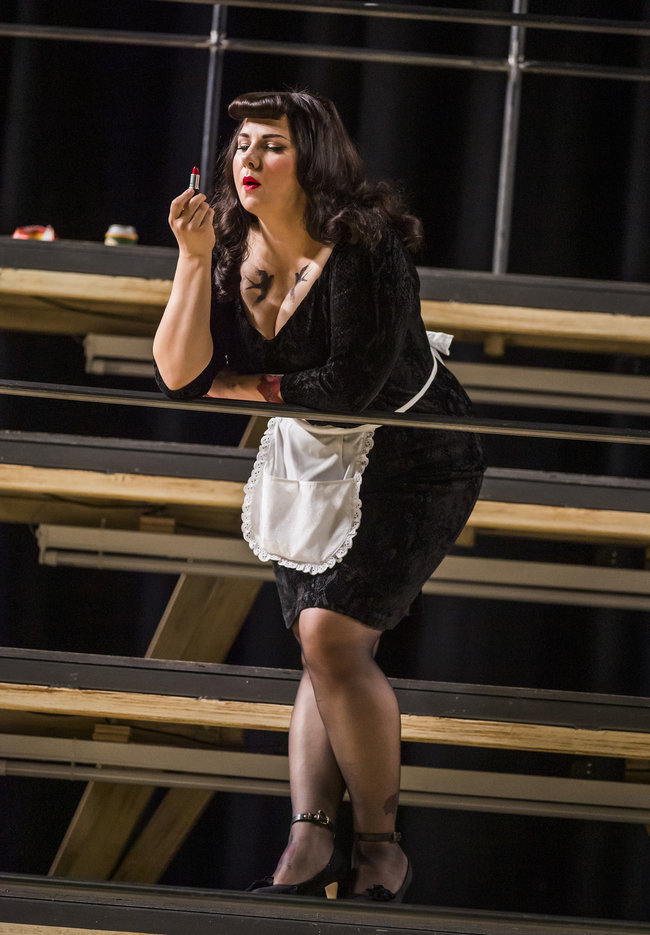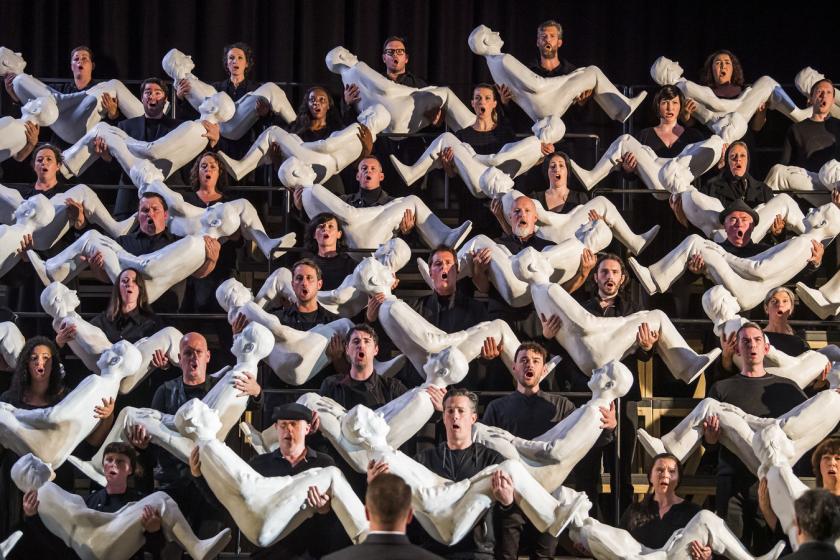Martinů's The Greek Passion is a bold choice as a season opener, all the more so given that Opera North are staging the rarely-seen original version of his 1957 opera. Commissioned for Covent Garden then shabbily ditched, this is faster moving and more cinematic than the radically rewritten edition performed in Zurich two years after Martinů's death in 1959. Based on Nikos Kazantzakis’s bestseller Christ Recrucified, it’s now alarmingly pertinent, a tale of refugees arriving in a small Greek village preparing to stage an Easter Passion play.
Christopher Alden’s powerful, spare staging has many virtues but giving his update a generic 1970s/80s feel seems a misstep: setting the action in the past five years would have made more sense. There are witty details: postman Yannakos (Paul Nilon) now sings to his trusty bicycle instead of a donkey and the spoken dialogue has been tweaked, with references to crisps, lager and veganism. But mostly this is a satisfyingly dark production. The village elders, led by Stephen Gadd’s oily priest Grigoris, dish out the plum parts to five locals, Nicky Spence’s fisherman Manolios chosen to play Christ. Manolios’s method acting is transformative; he loses all interest in his fiancé Lenio in favour of concentrating on the job in hand. When a group of refugees arrive in the village, they’re treated coldly by Grigoris even as they’re literally dying in front of him, and it’s Manolios and his four apostles who offer support.
 There’s a bald inevitability about what unfolds. Still, when it’s acted and sung as well as this, who’s complaining? Charles Edwards’ set is minimal in the extreme, little more than a set of raked temporary stadium seats which double as a mountaintop. Depicting the refugees as Gormley-esque white mannequins is a masterstroke, their anonymity a telling comment on how we prefer to look away instead of confronting injustice. It also means that the enlarged Opera North Chorus play both villagers and incomers, holding the white casts when giving them voice. Martinů's marvellous choral writing is brilliantly served; hearing 46 singers at full pelt is thrilling. Look closely at the larger crowd scenes and you’ll notice that each chorus member projects a distinct personality: these are real characters.
There’s a bald inevitability about what unfolds. Still, when it’s acted and sung as well as this, who’s complaining? Charles Edwards’ set is minimal in the extreme, little more than a set of raked temporary stadium seats which double as a mountaintop. Depicting the refugees as Gormley-esque white mannequins is a masterstroke, their anonymity a telling comment on how we prefer to look away instead of confronting injustice. It also means that the enlarged Opera North Chorus play both villagers and incomers, holding the white casts when giving them voice. Martinů's marvellous choral writing is brilliantly served; hearing 46 singers at full pelt is thrilling. Look closely at the larger crowd scenes and you’ll notice that each chorus member projects a distinct personality: these are real characters.
It’s cast with typical attention to detail. Nicky Spence nails Manolios’s endearing gaucheness, his journey from lowly shepherd to hero traced with intelligence, his voice comfortably soaring over the more fulsome tuttis. We feel for Lorna James’s discarded Lenio and wince as she throws in her lot with the slippery Nikolio (Alex Banfield). There’s an astonishing display from soprano Magdalena Molendowska’s widow Katerina in Act 3 (pictured above right). Company veteran Steven Page’s spoken interjections help clarify the stage action. Choral and solo singing is consistently clear, the surtitles largely unnecessary. This is a disarmingly straightforward tale of good versus evil, the villagers’ fickle attitudes a reminder of how easy it is for those in charge to manipulate public opinion. Martinů's luminous, eclectic score is handsomely conducted by new Music Director Garry Walker: watch out for the scene-stealing onstage band in the final act. Fans argue that Martinů was one of the great 20th century composers, and The Greek Passion’s high spots suggest that they’re probably right. This is an important, accessible production. Catch it while you can.
- At the Grand Theatre, Leeds, until 28th September then touring to Newcastle, Nottingham and Salford
- Read more Opera reviews on theartsdesk
- @GrahamRickson














Add comment